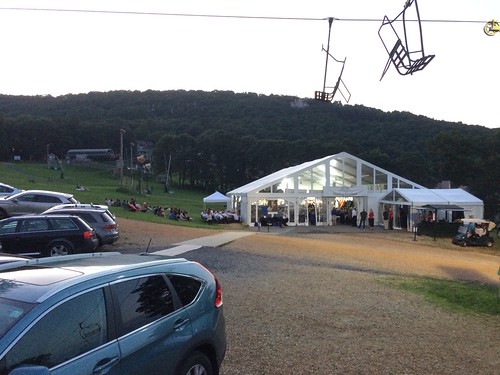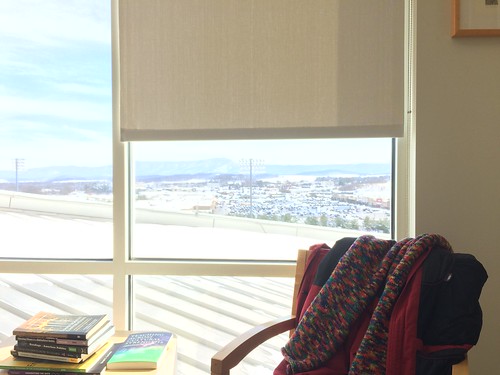What a weird week! No major events, workshop, or the like on my schedule, but no time at all for almost anything. Classes, meetings, and that was basically it! On the positive side, I had a number of good conversations with nice and interesting people (high five to my colleagues!), and I moved a number of projects along: our next cohort of
SCHEV Outstanding Faculty Awards nominees is ready to work on their proposals; this year’s
Review and Renew Your Career institute has been announced; and plans for a pilot Tenure and Promotion Dossier institute with librarians are on track.
Review and Renew Your Career (R2YC—cute, huh?) is an interesting story. For the last three or four year, we’ve invited
Peter Seldin and Beth Miller to hold their one-week Academic Portfolio programs, and last year, we all decided that JMU was now ready to run the program on its own. The Seldin/Miller Academic Portfolio Institute is a weeklong intensive activity in which faculty work with individual mentors to write portfolio narratives that explain their major achievements and how they fit into an overall cohesive career trajectory/theme/mission/set of values. The result is not only that participants achieve clarity about their career purposes—what they have done in the past, what was most important to them, and what they should do next—but also that they gain a deep sense of accomplishment. When I participated in the program two years ago, I was at a point at which I had been promoted to full professor, but with a sense that I didn’t really deserve the promotion. Let’s just say that the portfolio process persuaded me that the opposite was in fact true.
One of the difficulties that we encountered was basically branding. The Seldin/Miller-type portfolio structure does not perfectly correspond to the portfolios our tenure and promotion committees want to see. (In fact, different unit committees expect different formats.) Still, despite our explanations when we advertised the institute, most of the participants were faculty who were about to apply for tenure and who expected to write their tenure dossier. On the first day of the institute, we had to basically play bait-and-switch, and the responses were not exactly happy. Also, some past participants seem to have tried to submit their “institute” portfolios as tenure and promotion packages, to the chagrin of unit heads and tenure committees...
In response, we are restricting the institute this year to post-tenure faculty (or, for renewable-term and adjunct faculty, to those with extensive experience at the institution). In addition, we renamed the institute to de-emphasize the portfolio product (though this will be the central activity of the institute) and focus more on the career review and mentoring aspects, which we have found are the two most important outcomes of the program. To support faculty who need to get their tenure and promotion dossier together, I am piloting a weeklong institute with library faculty, which will not follow the Seldin/Miller model but will be more focused on writing, peer-mentoring, and informational meetings with senior faculty from the unit.
Writing
I put the finishing touches on my New Directions chapter. It looks like it’ll be out in print of a sorts at some point soon.
Reading
On Saturday mornings, I go over blog posts of the previous week, saving those I’d like to read during the coming week. Like that, I have increasing amounts of reading materials sitting there. And I am one or two weeks behind any discussion that’s happening on the blogs.
Boyd’s talk is not that tightly argued and meanders a bit, which adds to its richness but also means that different people will take it to mean slightly different things. Boyd argues (in my reading, at least) that media literacy as she has observed it runs the risk of making students susceptible to radical right-wing narratives. As students learn to question the political biases of media narratives, they will turn that analysis on their teachers, who recommend mainstream liberal media as reliable, factual sources. Conservative students will conclude that it’s “all opinion” (not Boyd’s quote, I think) and become open to right-wing persuasion.
Read it for yourself. There’s quite a bit more to the argument, of course, but the counter-arguments that you’re likely to think of still apply. One of the benefits of reading one or two weeks behind everybody else is that others have summarized your thoughts better than you could do it. In this case,
Maha Bali and
Benjamin Doxtdator pretty much say what I would have said if I had been less lazy (blog title!!!).
One point I’d like to add: One difficulty that contemporary politics, particularly in the US, faces is the lack of a common media reality. Two decades ago or so, an oligopoly of dominant media sources defined the agenda of public discourse: the New York Times front page, the network evening news, etc. With the advent of news aggregators, social media, their algorithms, and the like, this oligopoly is essentially gone. At first sight, this is a good thing, as it may lead to more democratic agenda setting. But it obviously raises major problems as well: What issues the public should focus on is an important coordination problem, and the coordinated media oligopoly was a solution to that problem. Now we don’t have a solution, and it looks like that instead of a national public we have separate, polarized partisan publics. That’s not good. Further, the media oligopoly maintained a basic agreement on what constitutes quality information, what type of empirical support facts should have, and the like. That’s largely gone, too, and that’s not good either.
I think that Boyd’s argument is at least in part about how education can help create a functional alternative to the lost media oligopoly, or how education fails to do so. How can we establish an agreement on standards for establishing facts, how can we determine which media stories to reject, how can we create agreement on common issues to debate nationally, how can we communicate and learn across ideological lines? Or maybe that’s the direction I would like the debate to take.
Music
Every couple of weeks I cannot resist the temptation and stop at
Booksavers of Virginia in Harrisonburg. I usually leave with a couple of CDs that I never thought I’d need. Most of my CDs—mostly classical music—come like that from various thrift shops. My most recent find was a CD with symphonies by the Danish composer Vagn Holmboe. It’s the most recent CD in my Arthur E. House, Jr. collection. I don’t know who Arthur E. House, Jr. is, or was, but he used to own a fair number of CDs that I now listen to. I know that he owned these CDs because the booklets all bear a stamp with his name. Mr. House also noted in tidy handwriting, usually fountain pen, where and when he had bought the CD, what the price was, and how much he paid for shipping, if he bought it online (Berkshire Records, of course). Occasionally, he’d also add up the playing times for pieces that were split up into different tracks.
Mr. House had an interesting and adventurous taste in music. Among other composers, he listened to music by Bill Schuman, William Grant Still, and Marion Bauer, besides Vagn Holmboe. I have a number of lesser known works by Rodrigo in my Arthur E. House, Jr. Collection, as well as Elgar’s Dream of Gerontion (Britten and Pears!), as well as a few nice recordings of music by Louis Spohr. And more things that I don’t remember. Here’s to you, Mr. House!

